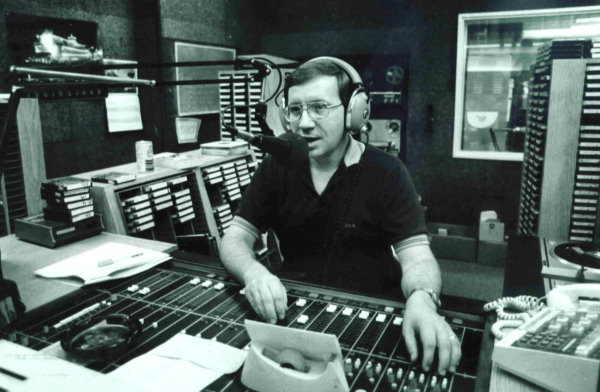|
Leonard Yates, disc jockey
Principal's broadcasting isn't limited to the
P.A. system
By Nancy Evans
Special Writer
Five days a week, H. Leonard
Yates is an elementary school principal. But on Sunday nights he secludes
himself in a soundproof, glass-enclosed booth, puts on his headphones and
turns into a golden-oldies disc jockey.
Yates, 36, the new principal of Trunnell Elementary School, broadcasts the
WAKY "Fourth Street Countdown" - a review of the week's top 40 songs from the
late 1950s to the early 1970s.
"It's a hobby for me," Yates said, preparing to play a commercial as a 1960s
anti-war song came to an end. "I've always liked the variety of Top 40 music,
and a countdown seemed to fit WAKY's format naturally."
WAKY, once a Top 40 station, switched to the golden oldies format March 1,
1982. Now it plays music popular from the mid-1950s to the mid-1970s.
When the station changed is format, Yates who lives in the Beechmont area,
came to WAKY with the idea of a countdown show on Sunday nights.
"We needed a strong, new show for Sunday nights," said Bob Moody, program
director.
WAKY already had a highly rated oldies show on Sunday nights, Moody said. But
when the station changed formats, he decided he needed something more unusual.
"I understand Leonard had gone to other stations with the idea of an oldies
countdown, but they were hesitant to hire him because he had no air
experience," Moody said.

Taking on a different role, H. Leonard Yates, Trunnell Elementary School's
principal, works as a disc jockey playing golden oldies from the 1950s to the
1970s on his weekly show, WAKY's "Fourth Street Countdown."
WAKY took the chance with Yates
because he knew a lot about Top 40 music and had a good collection of Top 40
charts, Moody said. A secretary had thrown WAKY's old charts in the trash, and
the station had no other records of them, Moody said.
"Leonard became very good on the air in a very short period of time. That's an
opinion shared through the company," Moody said. "I guess it came to him
naturally because he's heard so much of it."
But everything doesn't come naturally to Yates, who said he puts a lot of
research into his show. He depends heavily on reference books and his
collection of WAKY Top 40 charts.
Yates had collected the charts since the late '60s, but listeners have helped
expand the collection, giving him copies of their charts. WAKY stopped
publishing the free charts in 1979.
Yates tells his audience not only which songs were top hits, but also which
ones were popular in Louisville and didn't do well nationally.
The disc jockey said his special shows, aired about once every five weeks,
require the most work. While a countdown requires about two or three hours of
preparation, a special may take three or four times as much planning time.
"Since this show is done live -- and by records instead of tape -- there are
plenty of ways I could mess up," Yates said. So far, though, his worst
mistakes have been minor ones, he said.
Yates said he doesn't allow his radio work to interfere with his duties at
school. But on Sunday nights, Yates said, he thinks only about the radio show.
"I suppose when students and teachers learn that I do this, some may tune into
the show," Yates said. "I really don't think about it while I'm in school."
 |